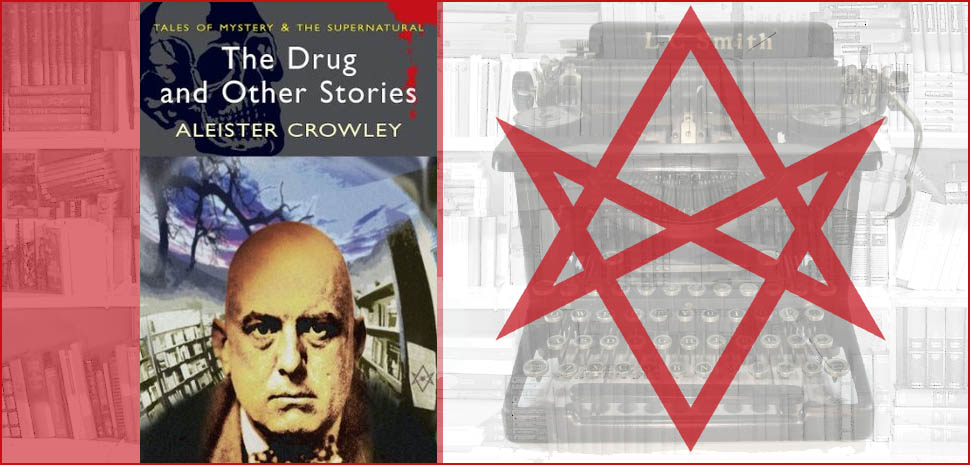A long while back I was a participating in a Facebook group discussion wherein a question was posed about the Wordsworth Editions volume of Aleister Crowley’s short stories titled The Drug and Other Stories. My response reflected my opinion held at that time, which I recall as along the lines of ‘It is a most excellent bedside book… in that it serves one well as a sleep aid.’
I had initially felt compelled to purchase the book on seeing that David Tibet had written the forward, being a massive fan of Current 93 and David’s artistic endeavours. Of course I had long studied Crowley’s work, but was never entirely taken by his fiction. I enjoyed Diary of a Drug Fiend sure, and Moonchild was enjoyable enough. When I first obtained my copy, I had read the first few stories and shortly thereafter my attention waned, so I moved on to reading other works by other authors who scratched my itch more effectively. Add to this that I tend to avoid short stories given that they tend to be hit-or-miss, and the book as a result sat collecting dust. It took a global pandemic and this quarantine period for me to finally decide on sitting and getting through the entire volume of 49 stories. While not immediately immersed, a bit through my endeavour I found quite a lot of pleasure in exploring its pages. Enough so, that I do intend to one day re-read from the beginning with more of an appreciation for the collection, and knowing which tales are worth skipping entirely.
The stories range and offer a nice variety of atmospheres and content. Some are quite a bore, others seem to meander without point or purpose, and some are even horribly written. Though, this is to be expected in a collection of published and previously unpublished works written over the course of an 18 year period between 1902 and 1920. Quite a few were unmistakably gems, and a number of them in the least could be considered thought-provoking. It’s a mixed bag, though getting to view this lesser-appreciated side of Crowley is worth setting the eyes upon. I mean, in one story there are characters that appear with the names General Graf von Donner und Blitzen, and Principe Raviole dei Spaghetti.
I would not highly recommend that any and all should pick up this collection and read it in its entirety due to its length and the varying quality within, but would pluck out a number of the tales and present them on their own. This is a collection with some shocking materials and language, situations and concepts that were offensive in their own times, and offensive now perhaps for entirely different reasons as society and culture has progressed. If one is a fan or student of Crowley’s writings, this is definitely worth having. I’ll write a short bit about the stand out stories to me below.
The Stone Of The Philosophers – Meeting in the Holbein House, a master, a socialist, a classic scholar, a doctor, and a poet share poetry with one another, and discuss, and debate god, religion and philosophical thought.
Cancer? A Study In Nerves – This story is a tunnelling into madness as an anxiety-ridden hypochondriac assumes illness ever grows within him and overwhelms his entire being.
The Soul-Hunter – A fun story formatted as the diary of a vampire who is studying a man as to find the location of his soul.
His Secret Sin – Crowley really shines in these normal or grounded tales. I wish he had focused on writing more of them. This one is about a quirky eccentric man who does not want his daughter Gertrude being independent and studying art, all the while having fetishized a photo of a nude statue which is almost treated by him like pornography. Ashamed of admiring the picture, he keeps it locked away in a safe. Gertrude confronts her father with the photo one evening and things escalate to a dramatic mind-blowing conclusion. (Click here to read it)
The Woodcutter – This is but a few pages long, so I dare not spoil it here. It would seem at home in a Stephen King collection. Seek it out and enjoy it, chop chop!
Professor Zircon – A horror story of love and jealousy with a twist ending and alchemical references. Professor Zircon is a scientist who shares his interest and gets her involved in an experiment in an unforgettable way.
The Testament of Magdalen Blair – This was a strong standout of the collection. Magdalen discovers she has psychic abilities and participates in experiments with her professor who soon becomes her husband. In the eventual communicating with her partner who is ill and succumbing to his illness, when he dies, the connection does not. She continues to experience what Arthur Blair is going through as he loses himself to the void and she must fight not to lose herself too. A fantastic horror short. (Click here to read it)
The Stratagem – A man is waiting at a remote station awaiting to board the next train when he encounters an unpredictable Frenchman (or so it is thought at one point in the story) who regales him of an escape from prison, which he details having been sent to after an incident of mass murder. I will spoil to write of it much beyond this, but in prison the Frenchman communicates through non-verbal gesturing, through ciphers and Morse code to devise their escape. This one is witty and a nice distraction.
Felo De Se – A young man entertains suicidal thought at a river, when he is approached from behind by a Thelemic Master. The Master through a mental game of chess provides all the reason and support for the young man to follow through with his expressed desire, if he so truly believes it. The Thelemic Master explains True Will, and provokes enough interest in the young man that he deserts his suicidal ideation and decides to enter life renewed as a Thelemic disciple. This one stands out in that it is interesting to see a ‘case study’ of sorts, of what Crowley’s ideas are of how a Thelemic Master would conduct themselves and respond to such circumstances.
Robbing Miss Horniman – Miss Horniman (what a name) possesses an impressive collection of diamonds. When she shows them to a clergyman, word seems to spread of her possessions and she becomes a target. Though Miss Horniman is armed with wit and gun, she lets her guard down when she soon meets another who has an ardent collection of rarities and gold worth much wealth. In lowering her defenses, she falls in love and leaves herself vulnerable.
Face – A doctor seems to use hypnotism in his practice, and one of his patients falls under his influence. The mother forbids his taking the young woman in marriage for she is against mixed-marriage, and things all go south from there. Vengeance and lives are taken.
Atlantis – This was a peculiar tale, many esoteric pointers here. Interesting and creative, this one is a standout not in terms of its writing as it isn’t the best of the collection by any means, but is a fictional historical look at the rise and fall of Atlantis called here Atlas and their discovery of the magical substance known as Zro. Crowley in his Confessions wrote of this, ‘In particular there is a sort of novel, “The Lost Continent”, purporting to give an account of the civilization of Atlantis. I sometimes feel that this lacks artistic unity. At times it is a fantastic rhapsody describing my ideals of Utopian society; but some passages are a satire on the conditions of our existing civilization, while others convey hints of certain profound magical secrets, or anticipations of discoveries in science.’ This short was designated as a Class C document in the curriculum of the AA and also in the curriculum of the OTO, this work is known also as Liber LI.
The Mysterious Malady – Another story told through the pages of a diary. A man has worked his way up in life and became a doctor though finds himself without contentedness or home. He meets a woman who becomes his wife, though he remarks on her descent into illness to which he sees no cure. He suspects she has gone mad, that she is on drugs, that she and others have been conspiring against him. The tale goes a bit predictable, especially in the context of the collection where a few stories come to similar ends, but this is well written and a good read.
The Bald Man – One of the more memorable stories for me, and one I wished was longer. A soldier medic sees the body of a young boy on the field, and the corpse is not cleared away when other bodies are collected. He cannot remove the sight of the boy from his mind and becomes haunted by the death to the point of madness.
There are a few other shorts which are worth reading for studying occultists, (Wake World, Three Characteristics, T’ien Tao, etc. come to mind. As well for Thelemites Across the Gulf is an interesting read, not the best written piece by any means, but you get to spend some time viewing the life of Ankh-f-na-khonsu). Overall, it is worth having the book on your shelf if you’re a fan of Crowley or gothic horror and mystery works from the early 1900’s.


